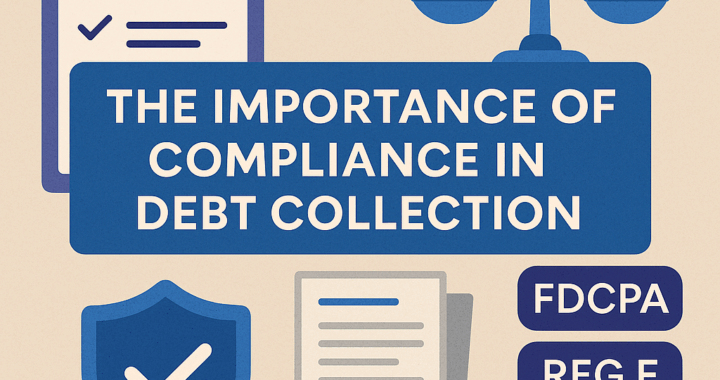In the debt collection industry, compliance isn’t just a best practice—it’s a legal and ethical necessity. With a regulatory landscape shaped by the Fair Debt Collection Practices Act (FDCPA), Regulation F, the Telephone Consumer Protection Act (TCPA), and oversight from the Consumer Financial Protection Bureau (CFPB), businesses must understand and adhere to these rules to protect their operations, reputations, and consumers.
Why Compliance Matters
Debt collection is a highly regulated activity. Non-compliance not only opens the door to lawsuits, fines, and investigations, but it can also erode consumer trust and damage a business’s reputation. Staying compliant helps ensure that debtors are treated fairly and that collection agencies maintain operational integrity.
Key Laws and Regulations to Know
1. Fair Debt Collection Practices Act (FDCPA)
The FDCPA is the foundation of consumer protection in debt collection. It prohibits abusive, deceptive, and unfair practices when collecting consumer debts.
Key Provisions:
-
No harassment or abuse (e.g., threats or repeated calls)
-
No misrepresentation or false statements
-
Debt validation must be provided upon request
-
Restrictions on communication times and third-party disclosures
Applies to: Third-party collectors and debt buyers.
2. Regulation F
Issued by the CFPB and effective as of November 30, 2021, Regulation F clarifies and supplements the FDCPA. It establishes clear rules around communication practices and consumer disclosures.
Key Provisions:
-
Limits the frequency of contact (no more than 7 calls in 7 days)
-
Requires a Model Validation Notice with specific information about the debt
-
Clarifies the use of email, text, and social media in collections
-
Emphasizes record-keeping and documentation requirements
Why It Matters: Regulation F provides safe harbor for compliant practices and helps standardize how agencies communicate with consumers.
3. Telephone Consumer Protection Act (TCPA)
The TCPA governs the use of telecommunication methods in collections, particularly auto-dialing systems and pre-recorded messages.
Key Provisions:
-
Requires prior express consent for automated calls to mobile phones
-
Imposes strict rules on text messaging
-
Violations can lead to statutory damages of $500 to $1,500 per call/text
Compliance Tip: Always verify and document consent before using automated dialing or texting.
4. Oversight by the Consumer Financial Protection Bureau (CFPB)
The CFPB enforces federal consumer financial laws, including the FDCPA and Reg F. It monitors debt collection practices through audits, consumer complaints, and investigations.
Consequences of Non-Compliance:
-
Regulatory fines and penalties
-
Civil lawsuits and class actions
-
Reputational harm and lost business
-
Permanent damage to consumer relationships
How Compliance Protects Your Business
-
Minimizes Legal Risk: A well-maintained compliance program can help prevent lawsuits and regulatory enforcement.
-
Improves Consumer Trust: Consumers are more likely to work with agencies that treat them with respect and transparency.
-
Boosts Efficiency: Clear policies reduce errors, improve employee training, and streamline collection efforts.
-
Enhances Reputation: Clients and partners are more likely to do business with agencies that follow the law and industry standards.
Final Thoughts
Debt collection compliance isn’t optional—it’s essential. Whether you’re a business outsourcing collections or an agency handling accounts, staying informed and proactive about regulations like the FDCPA, Reg F, TCPA, and CFPB requirements is critical to long-term success.
If you’re unsure whether your current practices align with today’s regulatory standards, consider consulting with compliance experts or legal counsel. In the world of debt collection, the cost of non-compliance far outweighs the investment in doing things right.

